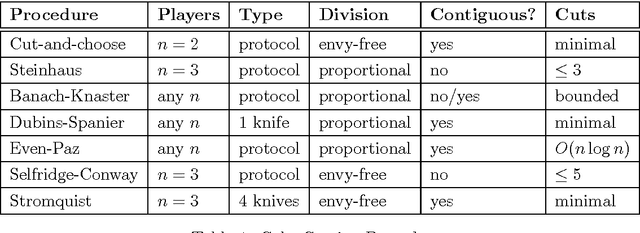Lecture Notes on Fair Division
Paper and Code
Jun 11, 2018
Fair division is the problem of dividing one or several goods amongst two or more agents in a way that satisfies a suitable fairness criterion. These Notes provide a succinct introduction to the field. We cover three main topics. First, we need to define what is to be understood by a "fair" allocation of goods to individuals. We present an overview of the most important fairness criteria (as well as the closely related criteria for economic efficiency) developed in the literature, together with a short discussion of their axiomatic foundations. Second, we give an introduction to cake-cutting procedures as an example of methods for fairly dividing a single divisible resource amongst a group of individuals. Third, we discuss the combinatorial optimisation problem of fairly allocating a set of indivisible goods to a group of agents, covering both centralised algorithms (similar to auctions) and a distributed approach based on negotiation. While the classical literature on fair division has largely developed within Economics, these Notes are specifically written for readers with a background in Computer Science or similar, and who may be (or may wish to be) engaged in research in Artificial Intelligence, Multiagent Systems, or Computational Social Choice. References for further reading, as well as a small number of exercises, are included. Notes prepared for a tutorial at the 11th European Agent Systems Summer School (EASSS-2009), Torino, Italy, 31 August and 1 September 2009. Updated for a tutorial at the COST-ADT Doctoral School on Computational Social Choice, Estoril, Portugal, 9--14 April 2010.
 Add to Chrome
Add to Chrome Add to Firefox
Add to Firefox Add to Edge
Add to Edge